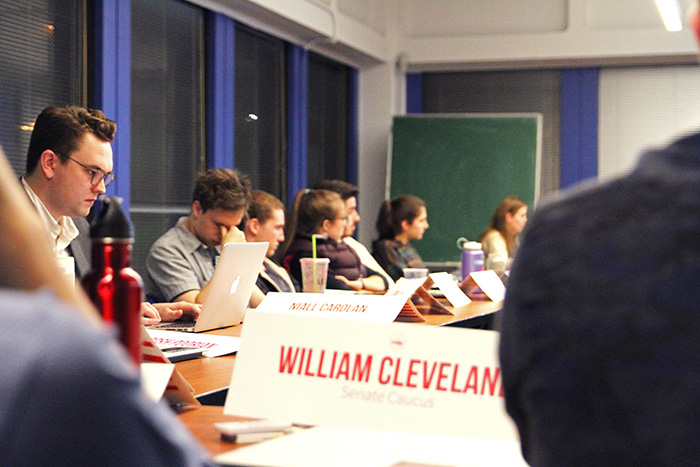On Oct. 13, the Students’ Society of McGill University (SSMU) legislative council discussed motions supporting the Association of McGill University Supports Employees (AMUSE) collective bargaining and distribution of free menstrual hygiene products. The meeting also covered the creation of a fee for the Musician’s Collective and increasing the student fee for Midnight Kitchen.
Free Menstrual Hygiene Products Fee
SSMU President Ben Ger presented a motion that would support the creation of a fund for freely supplying and distributing menstrual products on campus to undergraduate students. According to Ger, the purpose of the motion is to focus on advocacy for the provision of free products and will be funded by a provisional fee of $0.90 per student per semester if approved by the student body.
The higher pricing of products labeled ‘feminine’ and the perception of menstrual products as luxury goods are examples of the gendering of products. In comparison, items that are used by both genders—such as toilet paper—are supplied for free.
“A large part of this motion is about advocacy,” Ger said. “There will be education awareness, like lobbying around the gendering of products and the pricing discrimination surrounding the gendering of hygiene products.”
Elaine Patterson, VP Student Life, explained the logistics behind the distribution of menstrual products.
“[We] have done research on providing different types of menstrual products, mostly tampons and pads,” Patterson said. “We have research on different suppliers [….] The idea is that with [the $0.90] fee, there will be 20 pads and tampons for each student per cycle.”
According to Patterson, if not all tampons and pads get used, the leftover money will go towards alternative menstrual care products in the following school year.
AMUSE Collective Bargaining
AMUSE, a labour union that represents casual or temporary employees at McGill, is currently in the process of bargaining for a new collective agreement for its workers that regulates the terms and conditions of employees in the workplace. According to Claire Michela, president of AMUSE, independent research found that the average living wage in Montreal is $15.38 per hour: however, many AMUSE employees are paid $10.85.
“We compared our situation with McGill University Non-Academic Certified Association (MUNACA) employees who work similar jobs for more hours,” Michela said. “They get lots of benefits that we don’t. This [mandate] is basically regarding our demands which are basically to raise our wages, to make our jobs more stable, [and] to increase accessibility for students.”
Richard (Tre) Mansdoerfer, an engineering representative, voiced concern that small campus businesses may be forced to cut staff if the minimum wage is raised.
“It’s awesome to increase [the] minimum wage, […] but for something […that only has] four employees who are paid $12 an hour, […] an increase to $15 can mean that they can only hire three people,” Mansdoerfer said. “So, instead of increasing the amount of money available to every person, you increase the wage, but you have one person take a hit.”
When asked if raising wages will come at the cost of reducing the amount of available jobs, Michela said that this would not be the case.
“Casuals are doing more of the work than ever,” Michela said. “Casuals are and still would be way cheaper labour than MUNACA labour. It makes sense to keep hiring casual employees. I don’t think [cutting jobs] is very likely to happen.”
Creation of a Musician’s Collective Fee
Since its designation as a service in 2012, the Musician’s Collective has been subsidized by the SSMU general operating budget. The Musician’s Collective provides a public ‘jam space’ that can be booked by any McGill student, free of charge. To financially support the Musician’s Collective, an opt-outable $0.10 fee per student per semester was proposed.
The fee will be used to cover maintenance costs of the jam space. Patterson explained that SSMU’s general operating budget can no longer support the Musician’s Collective.
“All the expenses incurred by the Musician’s Collective [were] subsidized by the SSMU’s operational budget,” Patterson said. “Typically that ended up being $2,000 of SSMU’s operating budget. SSMU’s operating budget is [no longer] able to subsidize things like [the Musician’s Collective] because [subsidizing] is a non sustainable way of funding a service.”
A previous version of this article included a fragment of a quote from engineering representative Richard (Tre) Mansdoerfer that referred to Frostbite employees as members of AMUSE. In fact, only employees of McGill operations are covered under the AMUSE collective agreement, which does not include employees of student association operations like Frostbite. Additionally, the menstrual products fee was previously misstated.










This has got to be the stupidest proposal I have seen. It’s just another example of feminist extremists trying to push their agenda. Tax the men, use it to subsidize the women.